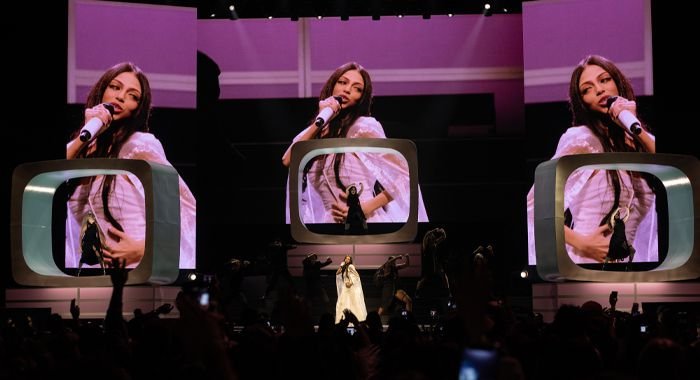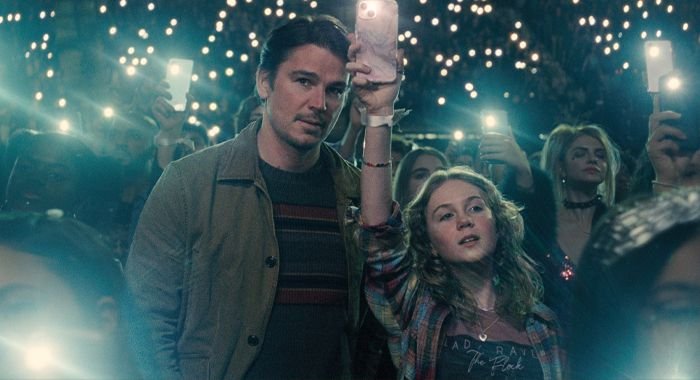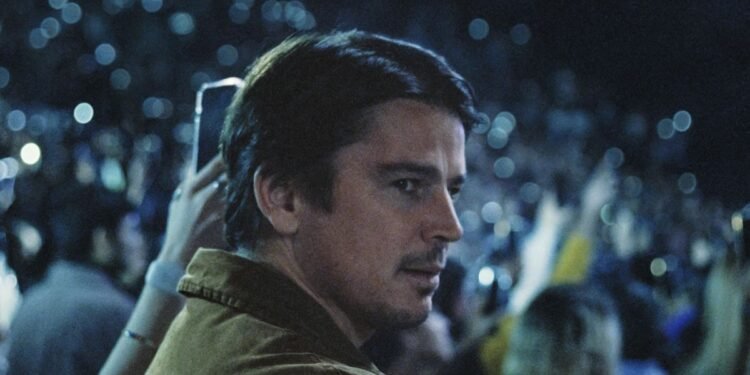It must be tricky marketing a M. Night Shyamalan movie. Reveal too much in the initial trailer for a movie like Trap, and it hinders the audience’s experience of the film. Reveal too little, and there’s no clear hook to persuade that audience to step into the theater. Then there’s the tightrope the director himself must walk in unfolding the story: Trap is about a serial killer named Cooper (Josh Hartnett) who goes to a pop music concert with his daughter, only to find out that the event is an elaborate — wait for it — trap to catch him.
This is all revealed in the trailer, and in the first 30 minutes of the film. In a different, perhaps better version of this movie, that early reveal would have been disastrous, undercutting the effectiveness of a major plot twist. As the film stands — it’s a fun but halfhearted execution of a killer concept, relying more on sentiment than suspense — it’s just a mild bummer to find out so soon.
Trap drops us in media res, with father and daughter on their way to a concert. The trap is already set, and the players are all in motion. Cooper walks into it, distracted by his daughter’s excitement and the duty he feels as a dad. Let me take this moment to say: The sooner you dispel any rational thought about how what an illogical law-enforcement plan a concert-trap is, the better! Shyamalan isn’t particularly interested in convincing viewers that the setup might actually work logistically — it isn’t really what this film is about.
Trap is sometimes distractingly bad, but at times, it’s also hilarious. Initially, the focus stays tight: on Cooper, his relationship with his daughter Riley (Ariel Donoghue, the sentimental heart of the film), and on how difficult it can be to balance serial killing with parenthood. The struggle!
Much of the film’s execution rests on Harnett’s capable shoulders. A former teen heartthrob who has had memorable recent turns in eclectic projects such as Penny Dreadful, Oppenheimer, and The Bear, Hartnett compels as both girl-dad firefighter Cooper and maniacally focused serial killer The Butcher. He’s obviously having a great time playing both these roles, and his likability is the most convincing tool in his evasion arsenal.
Hartnett still looks boyish, even in his 40s, and his good looks work in his favor. They’ve smoothed out into something slightly more relatable, aiding Shyamalan’s exploration of cultural assumptions, as Cooper leverages his all-American (read: white, clearly well-off) family-man status as he tries to outrun the trap. It’s enough to make you wish the film spent a little longer leading up to the reveal about Cooper’s serial killing, playing on our assumptions about who gets to be a movie good guy and who doesn’t. Alas, it’s tricky finding the right balance for the expected twist in a M. Night Shyamalan movie.

Photo: Sabrina Lantos/Warner Bros. Entertainment
The staging of the film’s concert setting, a production in its own right, is also impressive. For someone who’s been to many arena shows filled with screaming fans over the last few years, most of the concert staging felt spot-on. (Save, perhaps, for how many people were out of their seats and wandering the concession area during the show’s duration). It’s all held together by Shyamalan’s daughter Saleka, a real-life R&B artist, who plays fictional pop star Lady Raven. The most successful effort Trap makes is in convincing viewers that Lady Raven is a real phenomenon and her performance is a real concert. In many ways, this movie works better as a showcase for Saleka’s songwriting and performance skills than it does as a twisty thriller. There’s a fannish authenticity to the way Riley, Cooper’s teen daughter, is obsessed with Lady Raven, and how she and all the other concert-going extras around her have memorized every song lyric and every dance move from Lady Raven’s videos.
Perhaps in part because the film sometime feels like a multi-million-dollar showcase a father is giving his daughter as a gift (Shyamalan is putting all Hollywood’s other nepo-dads to shame here), Trap’s highest stakes come in Cooper’s relationship with his own daughter. The film doesn’t imply that Cooper’s joy in witnessing his daughter’s joy at the Lady Raven concert is anything less than 100% genuine: He seems earnestly invested in her happiness, and in the teen-girl machinations that left Riley on the outs with her friend group. Cooper is a serial killer who delights in chopping up innocent people, but he’s also a really good dad!
Trap is ultimately too distracted by minimalist explorations of other topics — Cooper’s relationship with his absent mother, the career of profiler Dr. Grant (Hayley Mills) — to be truly devastating in the way it explores Cooper and Riley’s relationship: Eventually, it’s almost entirely sidelined in favor of other late-arriving ideas and characters. Generally, Trap reminded me of serial killer TV series You and Hannibal, but it has far less time to artfully navigate the discordant tonal shifts that a killer-protagonist story dictates.

Image: Warner Bros. Pictures
But there are moments when that main plotline sings. In one particularly effective sequence, Cooper watches from the sidelines as his daughter gets the chance to dance on stage. He gazes at her happiness, the lights of the performance illuminating his smile. We’ve seen this character use his grin again and again to get away with breaking the rules, but there is nothing calculated about his emotions here. The film lingers, living in this moment where everyone seems to be happy, building the stakes around the crushing potential of it all falling apart. “Your daughter is going to remember this day for the rest of her life,” a well-meaning publicist tells Cooper. The audience and Cooper sit with the dramatic irony of the statement, wondering how, precisely, that prophecy will come to pass.
Within the Shyamalan pantheon, Trap skews closer to the superficial suspense of Old or the campy pleasures of The Happening than it does the raw, tension-filled ferocity of Split. It’s got a little too much on its plate and a little too much heart to be a sheer thrill ride, and it’s worth adjusting your expectations to that. Whatever else Trap may be, it is a Shyamalan movie through and through — ambitious in its initial concept, distracted in its thematic exploration, and delighted in its own twists. Twenty-five years after The Sixth Sense first knocked our socks off, at a time when every other Summer Olympics ad is shilling the “creative” power of AI, there’s something incredibly precious in a director who gets to make the movies he wants to make. Even when a Shyamalan film fails to trip us when it pulls the rug out from under us, it’s increasingly sweet to see the very human way they all try.
Trap is out in theaters now.















































